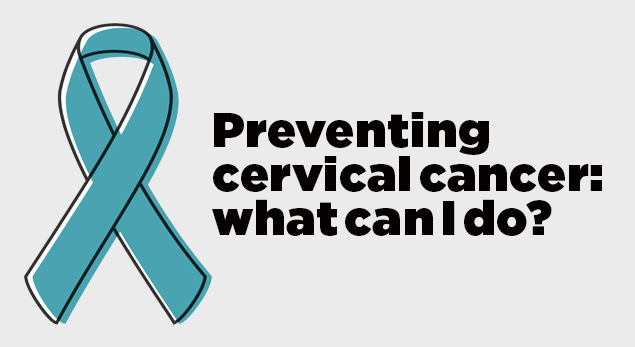We welcome all Rite Aid customers to switch to Pharmacy at Evergreen!
Preventing cervical cancer: what can I do?
January 3, 2025

When it comes to cervical cancer, what causes it, and how to prevent it, there are plenty of myths and misconceptions: let’s talk about it.
With screening and vaccination, cervical cancer is a preventable and treatable cancer. This National Cervical Cancer Awareness Month, read on to learn the easy steps you can take to protect yourself and your loved ones against cervical cancer.
What is cervical cancer?
Cervical cancer starts in the cells of the cervix (the lower part of the uterus that connects to the vagina). Before cervical cancer, abnormal cell changes start to happen on the surface of the cervix. If these abnormal cells aren’t treated, over time they can turn into cervical cancer.
MYTH: Cervical cancer is rare.
FACT: About 14,000 people in the U.S. get diagnosed with cervical cancer each year, and about 75 people in the City of Buffalo get diagnosed with cervical cancer each year.
What causes cervical cancer?
More than 99% of cervical cancers are caused by a long-term Human Papilloma Virus (HPV) infection. HPV is a common sexually transmitted infection (STI) – nearly every person who’s sexually active will become infected with HPV at some point in their life.
Most HPV infections go away on their own within a year or two as the immune system fights it off. However, some people have infections that last for years, leading to changes in the cells of the cervix that can eventually become cervical cancer.
Unlike some cancers, cervical cancer isn’t hereditary, so it can’t be predicted by your family medical history.
MYTH: I can’t get HPV if I’m in a monogamous relationship.
FACT: HPV can stay dormant in you or your partner’s body for years, so you can become HPV positive in a monogamous relationship.
Prevent cervical cancer with regular screening
HPV infections and cervical cell changes often have no symptoms, so the only way to know if you have them is to get screened. Talk to your gynecologist for their recommendations for screening. Screenings typically include a Pap test every three years starting at age 21, and an HPV test every five years from ages 30-65. These screenings are easy and quick and can be done at your gynecologist’s office.
When caught early, cervical cancer is one of the most treatable cancers: according to the American Cancer Society, 92% of people whose cervical cancer is caught early survive the next 5 years.
MYTH: I got vaccinated against HPV, so I don’t need to get HPV or Pap tests.
FACT: The HPV vaccine greatly reduces your chances of becoming HPV positive, but doesn’t eliminate them. Anyone with a cervix should follow screening guidelines.
Prevent cervical cancer with the HPV vaccine
The HPV vaccine protects against the kinds of HPV that can cause cervical cancer. It’s recommended to be given to children of any sex at age 11-12 before they become sexually active, but can be given up to age 45.
It’s important for people of any sex, gender identity and sexual orientation to be vaccinated against HPV because:
- It prevents HPV from causing cervical cancer in anyone with a cervix
- It prevents people from passing HPV to their partners with a cervix (heterosexual men should protect their partners from cervical cancer by getting vaccinated)
- HPV can also lead to other cancers, like throat, anal, or penile cancer. Being vaccinated against HPV lowers the risk of these cancers, including for men who have sex with men
If you haven’t been vaccinated against HPV, ask your primary care provider if it’s right for you.
Preventing cervical cancer for transgender and nonbinary patients
Getting gynecological care, including Pap and HPV tests, can be a difficult experience for transgender and nonbinary patients who don’t have access to trans-inclusive healthcare. Because of this, transgender men and nonbinary patients are less likely to be current on their screenings than cisgender women are, which means they’re more at risk of having a chronic HPV infection or cervical cancer without knowing.
Evergreen is dedicated to meeting the needs of our transgender and nonbinary patients and reducing their risk of cervical cancer. We provide trans affirming gynecological and pelvic care, and we’re committed to using your affirmed name and pronouns throughout your visit.
Unconditionally accessible care
People who don’t have access to quality medical care, whether it’s due to being uninsured or underinsured, not having a provider nearby, or a lack of culturally sensitive care, are much more likely to be affected by cervical cancer.
Our providers understand the disproportionate risk of cervical cancer that Black, Latino, Indigenous, and immigrant people face in the United States due to these barriers to care. We’re committed to providing culturally sensitive care and to lowering the rates of cervical cancer for everyone in our community.
If being uninsured or underinsured is a worry that’s keeping you from getting the care you need, we’re here to help — Evergreen’s dedicated financial counseling team can support you in finding the coverage that best fits your needs.